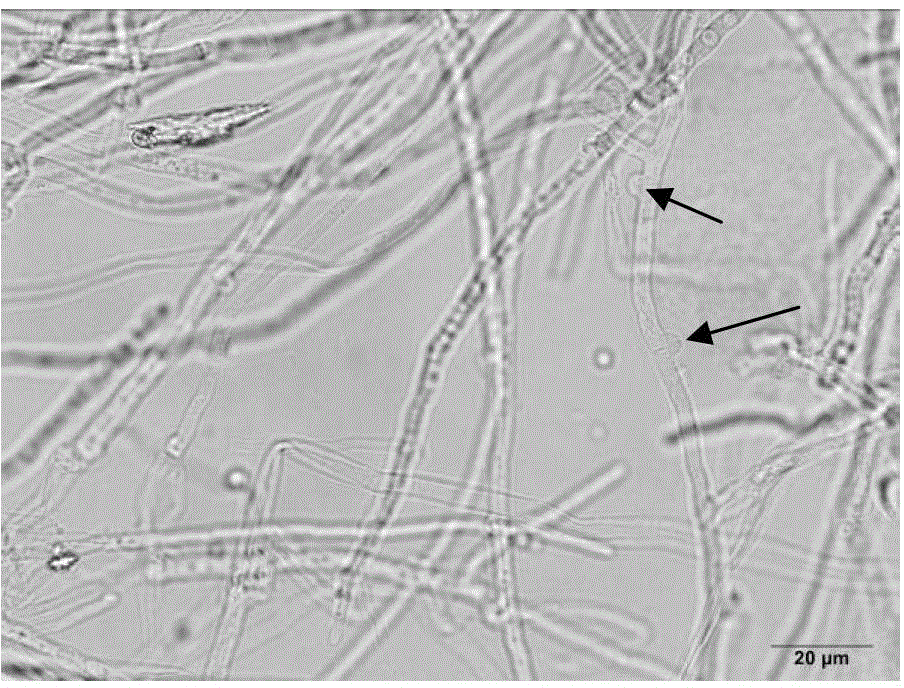Method for identifying protoplast monokaryon mating types of lepista sordida and special primer pair SR-4*2 thereof
A technique for protoplasts and protoplasts of Pleurotus edodes, applied in the field of identifying the mating type of protoplasts of Pleurotus edodes, can solve the problems of narrow temperature range, low yield, poor insect resistance, etc., and achieve high accuracy and reliability Effect
- Summary
- Abstract
- Description
- Claims
- Application Information
AI Technical Summary
Problems solved by technology
Method used
Image
Examples
preparation example Construction
[0032] The preparation method of the solid regeneration plate (RM): add sorbitol and agar to the liquid MCM medium so that the concentrations are 1M and 20g / L, respectively.
[0033] 1.2 Protoplast preparation
[0034] 1) Take the hyphae of A. japonica and culture them in liquid MCM medium at 160rpm and 25°C for 4 days (3-5 days are acceptable), filter and collect the mycelium with 3 layers of sterile lens paper, and then use 0.6M manna Alcohol aqueous solution washed 2-3 times.
[0035] 2) Suspend the hyphae (about 1 g) of A. japonica in step 1) in 1.5% lysozyme solution (dissolve 1.5 g lysozyme with 0.6M mannitol aqueous solution and set the volume to 100 mL; lysozyme was purchased from Guangdong Bide Biotechnology Co., Ltd., catalog number: Bd_8110001023), in a water-bath shaker (32°C, 60rpm) for 2 hours, filtered with 3 layers of sterile lens tissue and collected the filtrate.
[0036] 3) Centrifuge the filtrate of step 2) at 3000 rpm for 10 min and collect the precipita...
Embodiment 1
[0050] Example 1. Use of PCR primer pair SR-4×2 to identify the mating type of the protoplast monokaryon of the mushroom
[0051] 1. PCR reagents for identifying or assisting in identifying the mating type of monokaryon protoplasts
[0052] The reagents for identifying or assisting in identifying the monokaryon mating type of the protoplasts of A. variegata in this embodiment consist of PCR primer pair SR-4×2, 10×Taq buffer, dNTP mix, Taq DNA polymerase and ddH 2 O composition.
[0053] Among them, the PCR primer pair SR-4×2 is composed of two single-stranded DNAs, SR-4×2-F and SR-4×2-R, and its sequence is as follows:
[0054] SR-4×2-F:5'-CGGCACCTTCCATCATTTAC-3' (SEQ ID No.1),
[0055] SR-4×2-R:5'-TATGATTCCCTCTCCGTCCGT-3' (SEQ ID No. 2).
[0056] 10×Taq buffer, dNTP mix and Taq DNA polymerase were purchased from Beijing Shengxu Baichuan Company (CNS).
[0057] 2. Identify or assist in the identification of monokaryotic mating types
[0058] Inoculate the 30 protoplast mo...
PUM
 Login to View More
Login to View More Abstract
Description
Claims
Application Information
 Login to View More
Login to View More - R&D
- Intellectual Property
- Life Sciences
- Materials
- Tech Scout
- Unparalleled Data Quality
- Higher Quality Content
- 60% Fewer Hallucinations
Browse by: Latest US Patents, China's latest patents, Technical Efficacy Thesaurus, Application Domain, Technology Topic, Popular Technical Reports.
© 2025 PatSnap. All rights reserved.Legal|Privacy policy|Modern Slavery Act Transparency Statement|Sitemap|About US| Contact US: help@patsnap.com



